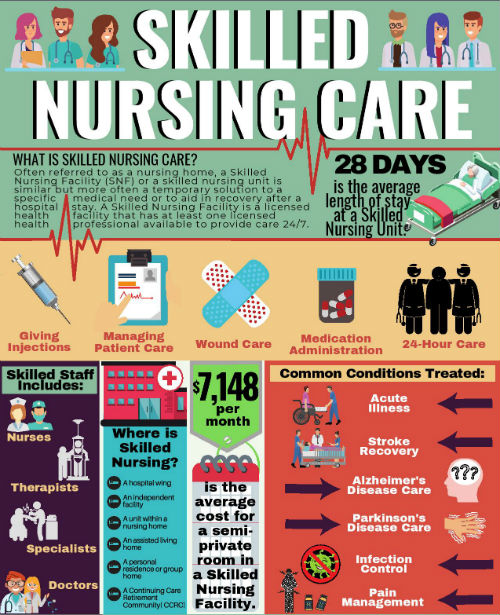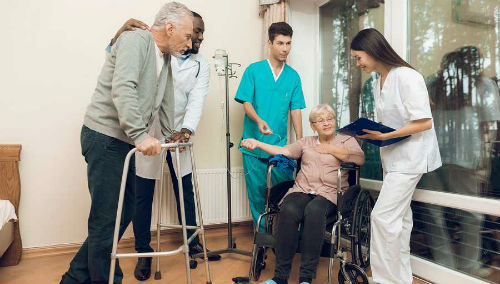
About Skilled Nursing
A Skilled Nursing Facility is a licensed health facility that has at least one licensed health professional available to provide care 24 hours a day. This is certified or trained medical staff -- a registered nurse, therapist, or doctor who can provide a high level of medical care and monitoring. Access to medication and assistance with activities of daily living are also part of skilled nursing care. Typically, the services provided by skilled nursing staff can occur in a variety of various care settings from nursing homes and assisted living communities to other long-term and short-term care facilities.
Top Cities for Skilled Nursing in the US
- Chicago, IL
- Los Angeles, CA
- Brooklyn, NY
- Houston, TX
- San Antonio, TX
- Philadelphia, PA
- Miami, FL
- Bronx, NY
- Fort Worth, TX
- Baltimore, MD
- Austin, TX
- Portland, OR
- Little Rock, AR
- Birmingham, AL
- Springfield, MO
- San Francisco, CA
- St Petersburg, FL
- Orlando, FL
- Cincinnati, OH
- Columbus, OH
- Fort Wayne, IN
- Memphis, TN
- Wichita, KS
- St Louis, MO
- Detroit, MI
- Charlotte, NC
- Indianapolis, IN
- Knoxville, TN
- Tucson, AZ
- Flushing, NY
Skilled Nursing Facilities
Often referred to as a nursing home, a Skilled Nursing Facility (SNF) or a skilled nursing unit is similar but more often a temporary solution to a specific medical need or to aid in recovery after a hospital stay.
Skilled Nursing can be offered in a variety of different places including:
- A hospital wing
- An independent facility
- A unit within a nursing home
- An assisted living home
- A personal residence or group home
- A Continuing Care Retirement Community (CCRC)
Skilled nursing services are increasingly in demand and offered in a variety of places to meet the needs of various patients.
What is Skilled Nursing Care?
Licensed, certified, and trained staff provide specialized care to patients. This includes rehabilitative care such as physical, occupational, and speech therapy. There is also more specialized care offered for Alzheimer and Parkinsons patients. Skilled Nursing involves professional medical staff able to administer medications and use special medical equipment.
Skilled Nursing is usually intended for those who need short-term medical care or services outside of a hospital following surgery, major illness or other serious medical treatments. Often times those who discharge from a skilled nursing facility will remain in a basic nursing home if care is still required.
What Is Included With Skilled Nursing Care?
Staff at skilled nursing units or facilities provide assistance with daily living tasks, such as hygiene, bathing, dressing, meals, housekeeping, and other personal care. The care can vary depending on if the skilled nursing happens in a hospital setting or a nursing home or another location. Examples of typical services provided at a Skilled Nursing Facility include:
- Planning, managing, and evaluating patient care
- Giving injections
- Inserting catheters and feeding lines
- Using aspiration devices
- Treating skin diseases
- Applying dressings for wound care
In addition, skilled nursing units can provide specific care plans to help with common issues such as:
- Parkinson's or Alzheimers Disease -- some units offer specialized therapies and treatment plans
- Wound Care -- Infection prevention and control, treatment, dressing and pain management
- Stroke -- Therapy and helping patients to regain movement and motor skills
- Acute Illness -- recovery of infections, injury, illness, symptoms and pain management
Skilled nursing care, whether short term or long term, is a comprehensive, high-quality, advanced care service for those transitioning after a major medical issue. The goal is to rehabilitate and improve symptoms so the patient can return home or to a lesser-care facility.
Who Needs Skilled Nursing Care?
Patients who typically access the services of a Skilled Nursing Facility include those exiting a hospital stay due to surgery or other major health procedure. Those recovering from joint replacement surgery, or bone fractures are common. Often times terminally ill patients get to the point of needing skilled nursing care in conjunction with hospice.
Other seniors who need skilled nursing care include those recovering from wounds, infections, respiratory issues, stroke or heart attack recovery, and complications from diabetes. Diseases such as Parkinson's, Kidney and bladder problems are also common to treat by skilled nursing care. Depending on the severity, several other other serious conditions and progressive diseases, including mental and physical decline, are reasons patients seek skilled nursing care.
Skilled Nursing Facility vs. Nursing Home
Often there is confusion when it comes to deciphering between nursing homes and skilled nursing facilities. A skilled nursing facility, or unit, is often referring to the level of care offered within a facility. According to the Centers for Medicare and Medicaid Services, the average stay in a Skilled Nursing Facility is 28 days. This type of care is also referred to as post-acute care, in that it usually follows a hospital stay.
On the other hand, nursing homes are intended for longer stays -- 835 days on average -- and for those individuals with less specialized or serious medical care needs. Nursing homes are not required to have licensed staff on site at all times, unlike skilled nursing facilities. A Skilled Nursing Facility offers more medically involved services and medical staff than a basic nursing home.
Increasingly, many nursing home facilities have skilled medical staff, and for the purpose of clarity it is assumed that the use of the term "nursing home" often includes access to care that an onsite skilled nursing unit provides. Additionally, nursing homes sometimes have special wings for dementia and Alzheimer's patients.
Skilled Nursing vs. Assisted Living
The difference between these services is that the custodial care in an assisted living facility doesn't require the skills of a registered or licensed nurse or physician. Skilled Nursing Facilities have a stronger focus on skilled care for medical conditions. The average stay in a skilled nursing facility is 28 days, vs. the average at an assisted living facility is just over 2 years. As one might guess, the access to skilled nursing staff increases the costs. According to a survey conducted by CareScout in June 2017, the national average monthly cost for a semi-private room in a nursing home is $7,148 versus a cost of $3,750 for a one bedroom in an assisted living facility.
Skilled Nursing vs. Home Health Care
Home health care is very similar to a skilled nursing care in that it can provide the same level of skilled nursing staff to provide services such as injections, health monitoring and care evaluations, wound care and intravenous or nutrition therapy but it allows the resident to remain at home. Unlike a skilled nursing facility with 24-7 monitoring, home health is usually provided for fewer than 8 hours per day and is typically less expensive. According to a survey conducted by CareScout in June 2017, the national average monthly cost for home health services is about $4100 versus a cost of $7,148 for a semi-private room in a nursing home facility.
Benefits of a Skilled Nursing Facility
The care received at a skilled nursing facility is crucial to health and recovery. This is considered transitional care since it often follows hospitalization. Skilled nursing facilities are beneficial for several reasons:
- 24-hour licensed staff. Trained and certified medical staff are available at all times.
- Therapy. Movement and exercise play a key role in mobility and physical recovery.
- Social Interaction. Sharing conversation, space, activities or experiences with others can aid in well being and healing.
How Much Does Skilled Nursing Cost?
According to a survey conducted by CareScout in June 2017, the national average monthly cost for a semi-private room in a nursing home was $7,148. This is just over $235 per day out-of-pocket. While it is unclear how much more actual skilled nursing services cost, it is somewhere in that ballpark. The costs can add up quickly, especially for stays longer than the average of 28 days.
How Can I Pay For Skilled Nursing Care?
Medicare
Those who qualify for Medicare will be happy to discover that it covers all or part of a stay in a skilled nursing facility up to 100 days. There must be a stay in the hospital prior for at least 3 days, and the following conditions must be met:
- Medicare-certified Skilled Nursing Facility
- Existing medical condition, or as a result of the hospital stay
- Benefit period has not expired (usually up to 100 days)
- Doctors referral or recommendation for skilled nursing care
If the above conditions are met, day 1-20 is fully covered by Medicare. A partial daily amount is covered from day 21-100. Beyond 100 days, skilled nursing care must be covered out-of-pocket by the patient, long-term or life insurance, or private funds.
Long-Term Care Insurance
Long-term care insurance is a policy that is purchased through a private insurance company. Similar to health insurance policies, the price varies greatly depending on age, general health and amount of coverage needed. Coverage could be denied for people with pre-existing conditions such as Alzheimer's disease or Parkinson's disease. Not all insurance will deny based on these conditions so it is important to explore different insurance companies.
Medicaid
Medicaid is a Federal and State health insurance program for those with low income and limited assets. Administration of the program varies by state, according to the Centers for Medicare and Medicaid Services (CMS). Medicaid covers skilled nursing care at Medicaid-certified skilled nursing facilities. Patients have to meet criteria for care in their particular State. Medicaid covers nursing services, rehabilitative and therapy services, medications, meals and more.
Medicaid may pay for a stay in a nursing home if the individual meets nursing home functional eligibility criteria and has income and assets below certain guidelines. A large number of Medicaid certified nursing homes and skilled nursing facilities are available in each state. Medicaid has strict eligibility requirements.
Aid and Attendance Benefit for Veterans
According to the VA website, the Aid and Attendance benefit (A&A) benefit is a special benefit for war era veterans and their surviving spouses. It is a tax-free benefit designed to provide financial assistance to help cover the cost of long-term care in the home, in an assisted living facility or in a nursing home. This benefit is for those who live in a nursing home or are mentally or physically incapacitated, or require the regular attendance of another person or caregiver in at least two of the daily activities of living. To learn more about the eligibility requirements and to apply for these veteran benefits visit VeteransAid.org online.
Private Funding
In situations when skilled nursing care costs aren't covered through other means, paying via private funds is an option. Sources of private funds for skilled nursing facilities include retirement accounts and 401Ks, savings accounts, annuities and insurance plans (including life settlements), trusts and stock market investments. Home equity and bridge loans can also be used when transitioning to a nursing home or skilled nursing facility, or extending the stay. Social Security can also be used as a means of paying.
Evaluating Skilled Nursing Facilities
It is important to take time to visit a few facilities if possible and inquire about services and staff prior to your loved one receiving care there. Some things to consider:
- Take a tour. Does the facility have adequate therapy equipment and social activities? Observe common areas, recreation and therapy equipment and other exercise devices -- a sign of a good recovery program.
- What is the reputation of the nursing staff? Turnover rate? Check the facility's record with the board of public health or question the facility ombudsman.
- Is the facility accredited? Medicare or Medicaid approved? Accreditation shows that the facility has taken extra steps to comply with The Joint Commission.
- How is the environment? Is it clean? Cheery? Are the furnishings and décor nice? Is the facility operated based on the needs of the staff or the needs of the patient?
- Where is the location? Is the facility close to family? Choose a facility that isn't too far away from regular visitors or family.
- Check reports & violations. See what issues the facility had in the past, if any.
If possible, ask to speak with current patients to see how they rate the care at the facility.
Skilled Nursing Regulations
Skilled Nursing Facilities and Nursing Homes are state regulated by the Department of Health in conjunction with the U.S. Centers for Medicare and Medicaid Services (CMS). Subject to inspections called "surveys," nursing homes are evaluated for any violations or immediate threats to patient safety and satisfaction. Unsatisfactory surveys are remedied by the nursing home administrator by proposing a plan of correction. Failure to improve on any violation could induce fines, reappointing managers, or suspension of new resident admissions or a facility's license, or even revoke a facility's license. Skilled Nursing Facilities are subjected to even more comprehensive evaluations due to the medical staff and more acute care nature of the facility or services provided.
Further Reading on Skilled Nursing Facilities
- The Difference Between Skilled Nursing and Nursing Home Care
- How to Find Medicare Ratings for Nursing Homes
- How to Pay for Nursing Home Care
- Tips for Choosing the Right Nursing Home
Top Articles in Skilled Nursing
View All
What is Nursing Home Care?
Nursing home care is a type of long-term care often meant for the elderly. In most cases, the seniors who live in nursing homes are no longer healthy, mobile, or independent enough to be cared for at home-or even in an assisted living community-but not ill in a way that demands hospital care. ...More
Read More
Skilled Nursing vs. Nursing Home
One of the most common and familiar senior care options is a nursing home. While the term skilled nursing is often used interchangeably, they are actually quite different. One is a type of care (skilled nursing) and the other is a senior living option (nursing home). ...More
Read More
Paying for Nursing Home Care
As what is generally the most expensive form of long-term senior care, nursing home care can be a pricey proposition for older adults and their families. If you are checking an elderly loved one into a nursing home facility, the decision to do so can be difficult enough as is, since nursing homes...More
Read More

 Your Information is Processing
Your Information is Processing